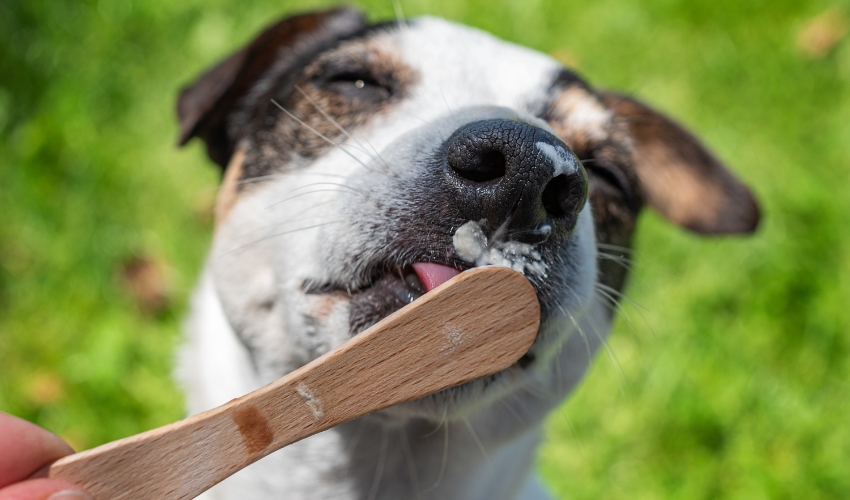A dog’s upset stomach can cause concern and discomfort for pets and owners. Knowing the right foods to offer during these times can make a significant difference in providing relief and aiding the digestive process.
This blog post will explore the 7 best foods for dogs with upset stomachs, considering their nutritional benefits, ease of digestion, and overall appeal to our best companions.
Causes of upset stomachs in dogs
Dietary indiscretions
Dogs are notorious for their curious nature and tendency to eat things they shouldn’t. Consuming spoiled food, garbage, foreign objects, or sudden dietary changes can upset their digestive system.
Bacterial and viral infections
Infections caused by bacteria (such as Salmonella or E. coli) or viruses (like parvovirus) can wreak havoc on a dog’s gastrointestinal tract. These infections often manifest as vomiting, diarrhea, and abdominal pain, requiring immediate veterinary attention.
Stress and anxiety
Dogs are sensitive creatures, and stress or anxiety can impact their digestive health. Changes in routine, travel, separation anxiety, or loud noises can trigger an upset stomach. Creating a calm and secure environment for your furry friend can help prevent such episodes.
Parasites
Intestinal parasites like roundworms, hookworms, and giardia can cause gastrointestinal disturbances in dogs. Regular deworming and preventive measures, such as flea and tick control, can help minimize the risk of infestation.
7 best food for dogs with upset stomach

Boiled chicken and rice: A classic remedy
When it comes to upset stomachs, boiled chicken and rice is a time-tested and veterinarian-recommended choice. Boiled chicken provides easily digestible protein, while rice adds a source of bland carbohydrates.
This combination helps soothe the stomach and provides essential nutrients without overwhelming the digestive system.
Pumpkin: Nature’s digestive aid
Pumpkin is a versatile and effective remedy for digestive issues in dogs. Rich in fiber, it can help regulate bowel movements, whether dealing with diarrhea or constipation.
Offer plain, canned pumpkin (not pumpkin pie filling) in small amounts to support your dog’s gastrointestinal health.
Plain yogurt: Probiotic power
Plain yogurt, rich in probiotics, can benefit dogs with upset stomachs. Probiotics promote the growth of beneficial bacteria in the gut, aiding digestion and supporting a healthy balance of microflora.
Ensure the yogurt is free from added sugars and flavorings, which can exacerbate stomach issues.
Boiled potatoes: A gentle carbohydrate source
When prepared without any added fats or seasonings, boiled potatoes can serve as a gentle source of carbohydrates for dogs with sensitive stomachs. Potatoes are easily digestible and provide energy without burdening the digestive system.
Oatmeal: Soothing and nutrient-rich
Oatmeal is a bland and soothing option for dogs with upset stomachs. It provides soluble fiber, which can help absorb excess water in the intestines and regulate bowel movements. Cook plain oatmeal and offer it in small amounts to comfort your dog’s tummy.
Ground turkey: Lean protein option
Similar to boiled chicken, ground turkey is a lean protein source that can be easily digestible for dogs. Cook it without adding any seasonings or oils, ensuring it is plain and suitable for canine consumption. This provides necessary protein without causing additional stress to the digestive system.
Bone Broth: Nutrient-rich medicine
Bone broth is a nourishing and easily digestible option for dogs with upset stomachs. It provides essential nutrients and can help keep your dog hydrated. Ensure the bone broth is homemade, without added salt or seasonings. You can offer it alone or mix it with other bland foods.
Treat Your Furry Friend’s Tummy Troubles Right! From belly rubs to the best food for upset stomachs, Doobert Shop has your pup covered!
Shop for a cause! Support animal welfare with every purchase at Doobert!
Considerations for feeding dogs with upset stomachs
#1 Small, frequent meals
Instead of offering large meals, provide small, frequent portions to avoid overwhelming the stomach.
#2 Hydration
Ensure your dog stays hydrated by offering water regularly. You can also include water-rich foods like plain cucumber slices.
Proper hydration is vital for dogs with upset stomachs. Considerations for ensuring adequate hydration include offering water to encourage your dog to drink water regularly to prevent dehydration and electrolyte solutions in cases of persistent vomiting or diarrhea; it may be beneficial to maintain a balance of essential minerals.
#3 Monitor for allergies
Be aware of any potential food allergies or sensitivities your dog may have. Introduce new foods gradually and monitor for any adverse reactions.
#4 Consulting with a veterinarian
While home care can be effective for mild cases of upset stomach, it’s crucial to seek veterinary advice in certain situations if vomiting or diarrhea persists beyond 24 hours or worsens, or signs of dehydration, including lethargy, sunken eyes, and dry gums, requires immediate veterinary care.
#5 Monitoring for improvement
Continual monitoring of your dog’s condition is essential. Look for positive signs such as gradual improvement in symptoms, including a return to normal appetite and energy levels, and transitioning from diarrhea to formed stools, a positive indicator of recovery.
A Doobert’s guide to soothing tummy troubles in dogs
Addressing tummy troubles in dogs involves more than just identifying symptoms; it requires a delicate balance of nourishment, care, and informed decision-making. Doobert’s guide carefully outlines the considerations for introducing suitable foods during these challenging times, emphasizing the importance of a gradual approach and mindful choices.
As we nurture our dogs back to health, let us embrace the principles of your dog’s tummy grace. Each choice becomes a gesture of love and care!
Stay in the loop with pawsome news! Join the vibrant Doobert Facebook Community and connect with fellow pup lovers on a mission!













